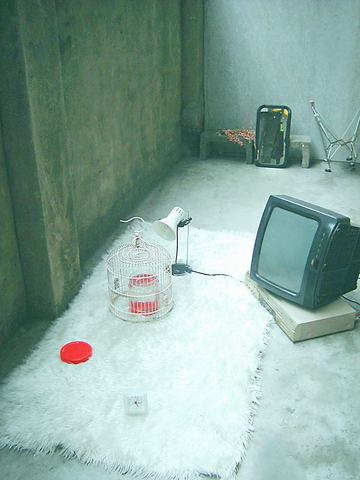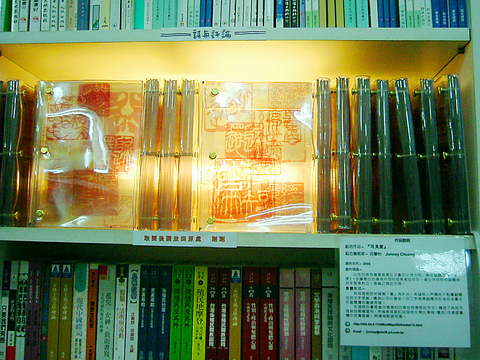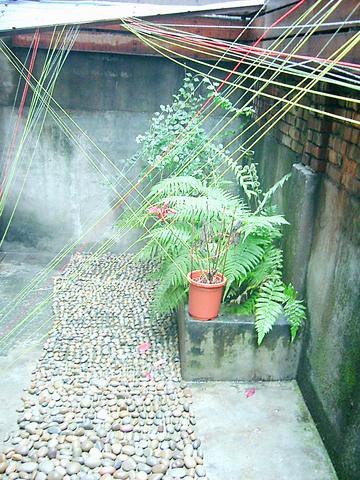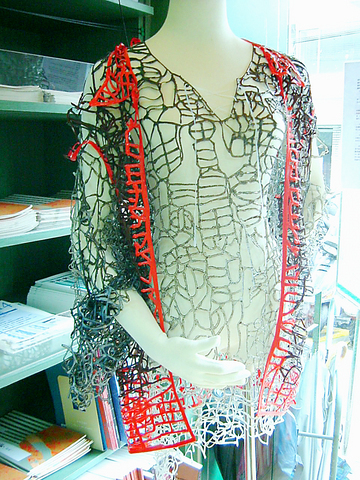Now that the weather is starting to clear up, staying indoors feels too confining. The Wenzhou Street Arts Festival II is located in various venues on or near Wenzhou Street and is a perfect springtime event to get you out of the house without costing a cent.
The festival allows you to explore local contemporary art while taking a stroll through the small lanes across from the National Taiwan University campus between the various cafes and bookstores where works are on display until March 12.

PHOTOS: SUSAN KENDZULAK
The first Wenzhou Street art festival was held in 2001 and was much smaller. This time, the organizers gathered 25 young artists -- mainly art students -- to exhibit in spaces that are alternatives to museums and galleries.

Unfortunately, the brochure and map (available in the participating locales) are only in Chinese, making the exhibition a bit of a daunting Easter-egg hunt for non-Chinese readers. The following will help guide you through this labyrinth of chic coffeeshops and dense bookstores.
The Rumiya Cafe (

One of the best works in the festival is James Lin's (

PHOTOS: SUSAN KENDZULAK
Cafe B & C (
In many of the cafes, the art seems like quiet decorative backdrops to the food being served. Giuliano (
At Cafe Chat Chat (聊聊咖啡), Chen Kuan-yu (陳冠宇) shows a video of people in slow motion. Chang Aji (張博智) has a small blinking light sculpture on the floor and Sakami Hane Jiro (瀨上羽二郎) has a framed photo with eyes that move.
At Ren Xing Kong Jian (
There are two installations at the Norwegian Wood Cafe (
Textile art can be found at the Cuckoo Cafe (
More literary-minded work is at Fem Books (
Huang Wen-lin (
A lot of the art on view is still in the incubation period of development. The festival is perfect for a date, letting you stroll hand-in-hand while stopping for coffee.
What: Wenzhou Street Arts Festival II
WHere: On and near Wenzhou Street, off Roosevelt Road and Xinsheng South Road
When: Until March 12
ON THE WEB: http://203.64.5.174/MindMap2005/

Behind a car repair business on a nondescript Thai street are the cherished pets of a rising TikTok animal influencer: two lions and a 200-kilogram lion-tiger hybrid called “Big George.” Lion ownership is legal in Thailand, and Tharnuwarht Plengkemratch is an enthusiastic advocate, posting updates on his feline companions to nearly three million followers. “They’re playful and affectionate, just like dogs or cats,” he said from inside their cage complex at his home in the northern city of Chiang Mai. Thailand’s captive lion population has exploded in recent years, with nearly 500 registered in zoos, breeding farms, petting cafes and homes. Experts warn the

The unexpected collapse of the recall campaigns is being viewed through many lenses, most of them skewed and self-absorbed. The international media unsurprisingly focuses on what they perceive as the message that Taiwanese voters were sending in the failure of the mass recall, especially to China, the US and to friendly Western nations. This made some sense prior to early last month. One of the main arguments used by recall campaigners for recalling Chinese Nationalist Party (KMT) lawmakers was that they were too pro-China, and by extension not to be trusted with defending the nation. Also by extension, that argument could be

Aug. 4 to Aug. 10 When Coca-Cola finally pushed its way into Taiwan’s market in 1968, it allegedly vowed to wipe out its major domestic rival Hey Song within five years. But Hey Song, which began as a manual operation in a family cow shed in 1925, had proven its resilience, surviving numerous setbacks — including the loss of autonomy and nearly all its assets due to the Japanese colonial government’s wartime economic policy. By the 1960s, Hey Song had risen to the top of Taiwan’s beverage industry. This success was driven not only by president Chang Wen-chi’s

Last week, on the heels of the recall election that turned out so badly for Taiwan, came the news that US President Donald Trump had blocked the transit of President William Lai (賴清德) through the US on his way to Latin America. A few days later the international media reported that in June a scheduled visit by Minister of National Defense Wellington Koo (顧立雄) for high level meetings was canceled by the US after China’s President Xi Jinping (習近平) asked Trump to curb US engagement with Taiwan during a June phone call. The cancellation of Lai’s transit was a gaudy